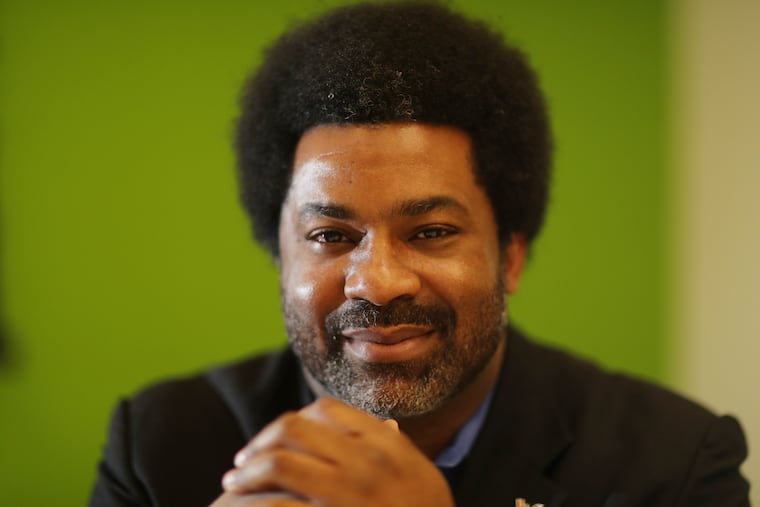Black teachers matter. How do we get more in the classroom? | Opinion
Research shows that black students, particularly those from low income backgrounds, will be 39% less likely to drop out if they have a single black teacher.

Districts and schools search incessantly for meaningful, sustainable, and effective school-based interventions — and those efforts often fail. Tons of money has been spent on countless reform concepts: “whole language,” “small schools,” “schools within schools,” “small classrooms.” The list goes on.
But what if one of the best interventions is sitting in our schools right now?
Research and experience yields that one of the best, most impactful interventions has been largely lost over the years. The Association of American Educators Foundation, The Fellowship: Black Male Educators for Social Justice, the Center for Black Educator Development, and 73 other education organizations signed a letter dated May 22 calling for more awareness, funding, and policy to increase teacher diversity.
Imagine if we could decrease black dropout rates by 40% through a tried and true, researched-based intervention. What would your response be? Would you slowly walk to that intervention or would you run? Would you wait for the arc of educational justice to bend, or would you try to hammer that arc?
Representation matters. A study from Johns Hopkins University demonstrated that black students, particularly those from low-income backgrounds, will be 39% less likely to drop out if they have a single black teacher. Imagine if 40% of Philadelphia’s teachers were black, as used to be the case, more in line with our student demographics than our current tally of 23% black teachers and 70% white.
Research also shows that black teachers have higher expectations for black students. Black teachers can look at the same black child and see a high school graduate, while their white peers have been shown to more often see the same child as a dropout. Black teachers are more likely to recommend talented black children to gifted programs, less likely to refer the child for suspension and identify them as special needs.
We know that hiring more black teachers would improve outcomes for students. The real question is, how do we go about doing this. Do we need more black teachers before more students choose to follow their lead into the profession? Or, do we directly engage students now to become teachers?
So many black students have horrific experiences in school. Their hair is being cut, like Buena Regional High School wrestler Andrew Johnson, who was told by a white referee that he would have to cut off his dreadlocks or forfeit during a meet. They are suspended, searched, and criminalized. As Columbia professor and black educator Chris Emdin remarked, for many black students, returning to school after they leave is like returning to the scene of a crime that hurt them. For the victim, that can be triggering — and we already don’t have enough school counselors. What does resonate with those who hadn’t previously considered teaching is an opportunity: Become the teacher you wish you had and knew you needed.
One of the biggest determinants of whether a black boy will decide to become a teacher is his classroom experience with his current teacher. We can’t be passive about ensuring the intellectual, cultural, and emotional safety of black youth, taught by mostly white women who may not be familiar with all their students’ needs. Professional development that mandates culturally responsive teaching, with evidence of practice, is necessary.
And beyond expanding recruitment efforts, we cannot neglect efforts to retain black and brown teachers who join the profession.
Here are a few things we can do:
● Ensure schools provide multiple leadership opportunities for effective teachers of color. Black teachers with great relationships, pedagogical and technical skills, and subject knowledge should receive due respect for their expertise.
● Decrease the invisible tax these teachers can experience. While all new teachers struggle, black teachers in particular are often left to navigate their supervisors’ race, class, and privilege issues.
● Provide support systems. Every new teacher should receive a mentor and a coach. If possible, this should continue for the first three years of a teacher’s career. The School District of Philadelphia, for example, currently purchases memberships to The Fellowship: Black Male Educators for Social Justice for all new black male hires.
● Ensure white teachers and school leaders take ownership of the ways race, class, and privilege play out in their schools and classrooms. Too often, black educators are expected to professionally develop their entire school community about issues involving race.
To this end, The Fellowship: Black Male Educators for Social Justice is launching the Center for Black Educator Development (CBED), which will double down on the four P’s: delivering professional learning, mentoring, and development; supporting the teacher pipeline; advancing policies that diversify the teacher and educator workforce; and developing partnerships that align with our goals. Our main focus this summer will be to expand Freedom Schools by two sites – working with high school and college students to teach first through third graders during a six-week program.
We must recruit and retain both our new and veteran black and brown teachers. It is one of the most effective interventions that a school, district, and state can implement on behalf of their students.
Sharif El-Mekki is the principal at Mastery Charter School-Shoemaker campus in Philadelphia that serves 780 students in grades 7-12 and director of the Center for Black Educator Development. He blogs at Phillys7thWard.org and is a featured voice on Education Post.